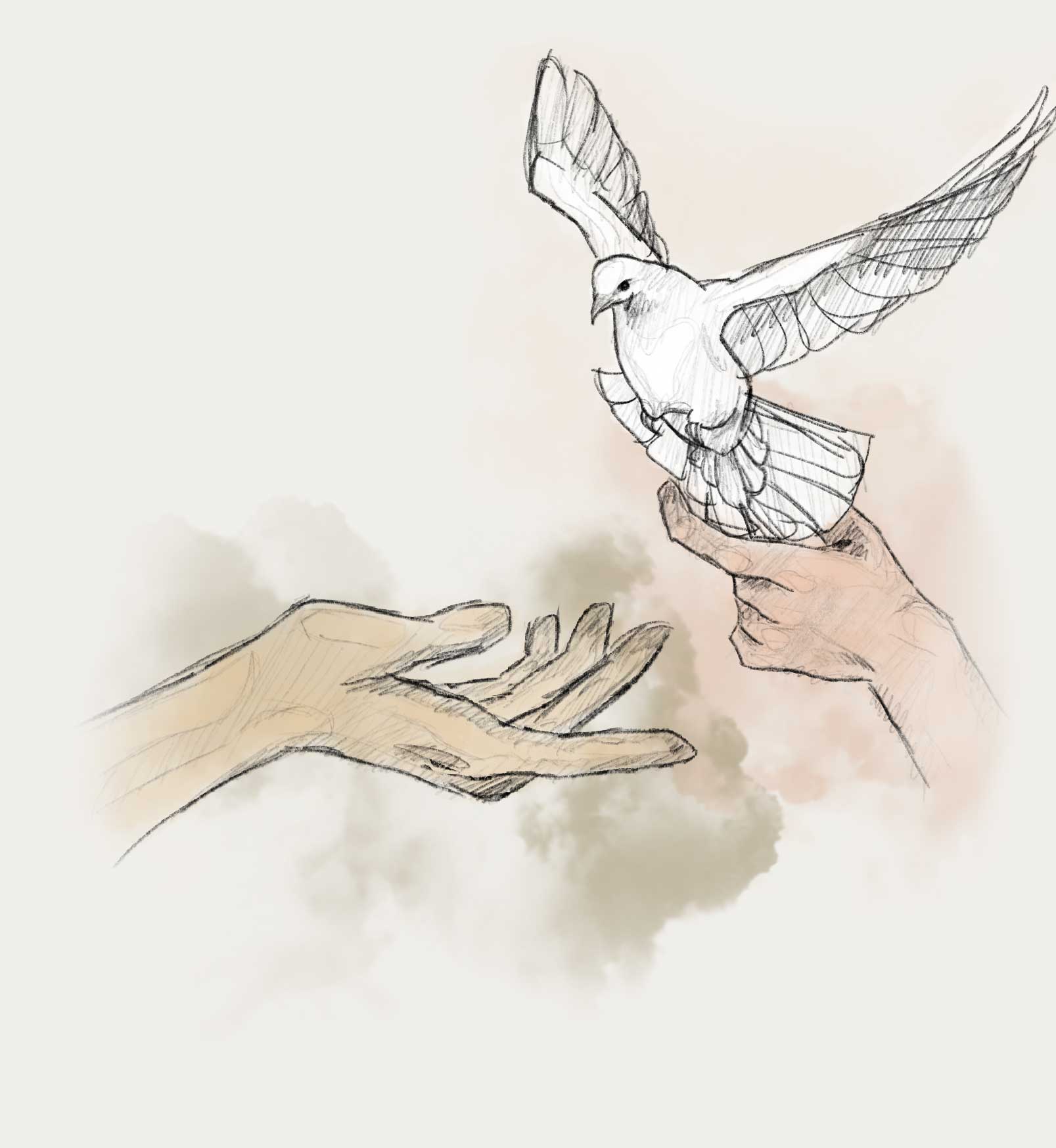



Your contribution ensures this site will be around to serve thousands who use it daily to pray.
A monthly recurring payment is not required, but your support ensures this site will be around to serve thousands who use it daily to pray. You can select the amount of your monthly contribution below, or you can select "custom amount" and set it in the next page.
If you prefer not to commit to a monthly contribution right now, please consider a one-time contribution. You will be able to set any amount in the next page.
You can also contribute through PayPal from this page, or you can mail a check.
News and Updates from our ministry
Monica on April 30th, 2024at 10:00
Dear Community, The Divine Office Ministry and the creators of the Rosario app share a common mission, to bring people together in prayer. For that, we are happy to covey their message: “For Christians, the... Continue reading
 Login to like (104)
Login to like (104)
Monica on May 29th, 2023at 6:25
Dear community, In an effort to encourage and promote among our community members more interaction, communication and spiritual support for one another, Divine Office has been working on a new email notification system where members... Continue reading
 Login to like (100)
Login to like (100)
Monica on May 10th, 2023at 3:35
Dear Community, Adoremus.org had published a fragment from the January 2022 Bishop’s Committee on Divine Worship Newsletter concerning the progress ICEL and USCCB made on the new edition of the Liturgy of the Hours. The... Continue reading
 Login to like (34)
Login to like (34)
Monica on December 30th, 2022at 11:07
Dear Community, At the start of the New Year, our gift to you is a new website design with a different architecture. We meant it to be fresh and beautiful, to promote our members’ interactions... Continue reading
 Login to like (36)
Login to like (36)

Pray always and everywhere with our Award-Winning Liturgy of the Hours app for iPhone, iPad, Android and Kindle Fire. NOW FREE!



Our DivineOffice app is rated 4.9 out of 5, based on over 2,400 ratings and won the About.com Best Catholic App Award for 3 years in a row.





Pray anywhere
I have prayed the Divine Office for many years. [...] When I discovered this app, all of my concerns of ribbon placement were gone. Having the Divine Office on my phone is absolutely the best thing ever! The sense of community is so wonderful as I see how many others are praying at the same time as myself. [...] Now I don’t need to turn a lamp on as I use to when I used the Office printed volumes. It is such a blessing to have the Divine Office in my pocket. Many times I’ve been sitting in a doctor’s waiting room at the time of Mid Morning prayer. It is so calming of any worries to pull out my phone, open the app, and be able to connect with Our Lord at those times I need Him most. I don’t use the audio version much but the few times I’ve traveled, it is so comforting to not have to skip the Office in order to keep my hands on the steering wheel and my eyes in the road. I recommend this app to friends all the time, especially to those who’d like to pray the Office but feel intimidated by the size of the printed version and getting the ribbons placed properly. Thank you for developing this app. It is my constant companion.
SheezyOCon October 13, 2021





Super helpful
I have only been introduced to the divine office prayers two times before I downloaded this app. It is laid out in a way that is very easy to understand, and there is an audio option that will say all of the prayers. There is an option to set reminders throughout the day. I got this because, I didn’t really know how to say the divine office, and I didn’t know what prayer books I needed to purchase to begin. During the shutting down of churches for covid :( this has been a wonderful resource. One cool feature is that you can tap on the “in prayer” link and see little specks of light around the globe lighting up in the area that someone else is praying. It’s so cool to see everyone praying with you and is a powerful reminder that we are all connected and unified in Christ’s mystical body.
tori6543588on May 5, 2020





Praying with the whole Church
I love this app! Since it is now free and no longer for sale, I made sure to donate the price of buying it, and then some. I have loved the Liturgy of the Hours for 25 years. But I always felt alone when I prayed it. With this app, I am connected to others! I use it in conjunction with my printed Christian Prayer volume. On other days, I cannot get to my book but with the app, I always have the prayers available. I have the printed calendar with my book, but I actually rely on this more for placing my ribbons. The audio is wonderful!! I often read out loud with it. I love that I can change the speed of the audio! I have found that 1.3 is good for me. Thank you, thank you, thank you for this app. Thank you for still supporting it. Thank you for updating the “one God,” to just “God” change in the prayers. My book still throws me off but your app is right! Highly recommend this. Many friends have it. THANK YOU!!
MommytoNFP2on June 12, 2022

Support us by starting your amazon shopping by clicking on this link.



Dear edenj,Thank you for your response. You wrote a beautiful reflection; I do wish to compliment your work. It just confused me for the moment until I received your explanation.God bless you this day!
Venerable Pope Pius XII claimed that St. Therese, the young Carmelite had done no less than rediscover the Gospel for the modern world: “It is the Gospel itself, it is the heart of the Gospel that she rediscovered; but with what grace and freshness: ‘If you do not become like children, you shall not enter the Kingdom of Heaven’” (Mt 18:3).To say that she had recovered not only a neglected truth but the very “heart of the Gospel” is like announcing that someone has unearthed the treasure buried in the field or found the pearl of great price. It suggests that the mysteries that Christ once spoke openly to the world have been received anew by one with ears to hear. And thus the ancient thunder of Gospel teaching reechoes through the voice of an unlikely herald: a girl cloistered from the world in a small Carmel located—not even in Paris—but in a forgotten French town.St Therese reintroduced modern people to what it means to be a child of God more than in name only. Her teaching may not come across in the sweeping, apocalyptic tenor of a prophet, nor with the urgency of a private revelation. Yet for those with ears to hear, the muted tones of her “little way” of spiritual childhood resonate with the equally subdued character of daily life. Woven of aspirations, trials, successes and setbacks, our daily experiences spontaneously converge in a cry for God’s help. How often do we find ourselves needing and asking for strength—even courage—to make it through the ordinary duties and pressures of life?St Therese’s little way defuses the distress that our weaknesses might cause by encouraging an open avowal of one’s limitations. She declares: “It is so good to feel that one is weak and little!” This is because Jesus reserves His saving mission for the lost, the sick, and the forsaken. When we recognize our place in one or more of those categories, then we reach the same conclusion as St Paul who not only refused to conceal but preferred to boast of his weaknesses (cf. 2 Cor 11:30; 12:9-10).Therese explains her little way:“It is to recognize our nothingness, to expect everything from God as a little child expects everything from its father … to be disquieted about nothing, and not to be set on gaining our living,” that is, “the eternal life of heaven.”Therefore she resolves: “I never wanted to grow up,” in spirit, so as to avoid taking credit for whatever good she might do. Rather, to remain little means “believing oneself capable of anything,” while never becoming discouraged over failures, “for children fall often, but they are too little to hurt themselves very much.”For those who seek signs and wonders this is not the way. But for all who seek to know “the only true God and Jesus Christ” (cf. Jn 17:3), it is all one needs to know. Knowing God as He has revealed Himself, speaking to Him in the language He has given us, loving Him on the terms that most please His heart, instinctively leads St Therese to converse freely of “Papa, God,” echoing Jesus’ own use of the intimate “Abba.” St Paul will offer this as evidence of the indwelling Spirit: “You have received the spirit of sonship. When we cry, ‘Abba! Father!’ it is the Spirit himself bearing witness with our spirit that we are children of God” (cf. Rm 8:15-16).Our Lord undeniably wants our interior life revolutionized by this teaching, as He proves in settling the Apostles’ dispute over which of them was the greatest (cf. Lk 9:46-48; Mt 18:1-4). Jesus responded with a surprising but concrete visual aid. He inserted a child into the midst of grown men and, once all eyes and ears were trained on the spectacle, laid down the entrance requirement for His kingdom: Be like this. You will not enter the kingdom of God unless you become like this child.To big and strong men who had other ideas about what it meant to be great, this is the answer they get. And Jesus leaves them to contemplate and apply the meaning: Somehow the child that we see out there in the arms of Jesus has to become who we are on the inside.This unambiguous call to humility, to childlike dependence and trust, also leaves us to wonder: In practice, what does it look like for me to receive the kingdom of God like a child? St Augustine of Hippo offers a concise and eloquent hint: “Man, grown old through sin, is rejuvenated through grace.” Just as sin “ages” the soul not only by debilitating but by hardening it, so grace renews us. It is only to the humble that God gives grace, not from any stinginess on His part, but because a proud, “grown-up” soul is incapable of receiving grace or any gift in a fruitful way: “God opposes the proud, but gives grace to the humble” (Jas 4:6).Being a child spiritually is not a matter of age, but of humility. Thus the profile of a childlike adult looks like this: one who is not only convinced of his need, but also not ashamed of it. Such a child never tires of approaching the Lord, never feels like a bother to Him: “Let the children come to me, and do not hinder them,” says our God to us (Mt 19:14).The truth that we are God’s children is, possibly, a neglected truth because it is most fundamental to Christian identity. We don’t think much about a building’s foundations, we just live and work in it. But those who would build their house on weak foundations will falter and fall sooner or later (cf. Mt 7:24-27).Thus urges St Josemaria: “Do not forget: anyone who does not realize that he is a child of God is unaware of the deepest truth about himself” (Friends of God, no. 26). If we don’t consider this the deepest truth about who we are, then on what foundation does our identity stand? Our ethnicity? Our hobbies, career, being somehow “better” than others?But if God were to ask us: When do you think you are most pleasing to me? When are you most yourself? Would we answer: “When I’m successful? When I’m a winner? When I’m appreciated by others?” I think the Lord would answer us: You are most pleasing to me, most yourself, when you are most like a child. You can lose just about anything—success, esteem, reputation—but not your adoption.St Therese (and St Josemaria) would have us remember that, wherever we are and whatever we do, this is the heart of Gospel—which can be not only rediscovered but relived daily, renewing us in spirit all the while.
May I please enquire the connection to my posting? St. Therese of Lisieux has a feastday on October 1st. I do not grasp the connection with a married couple who were early catechists in the Church. Please explain.
I am very sorry; it was a mistake. I had meant my post as a reflection on what it means to remain a child spiritually.